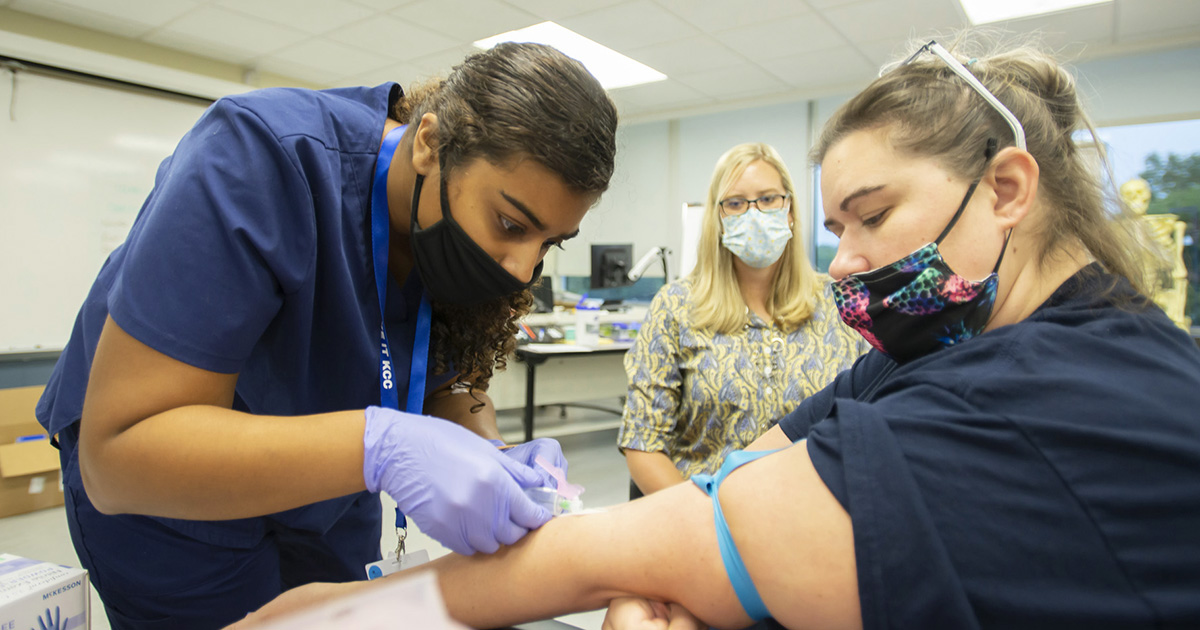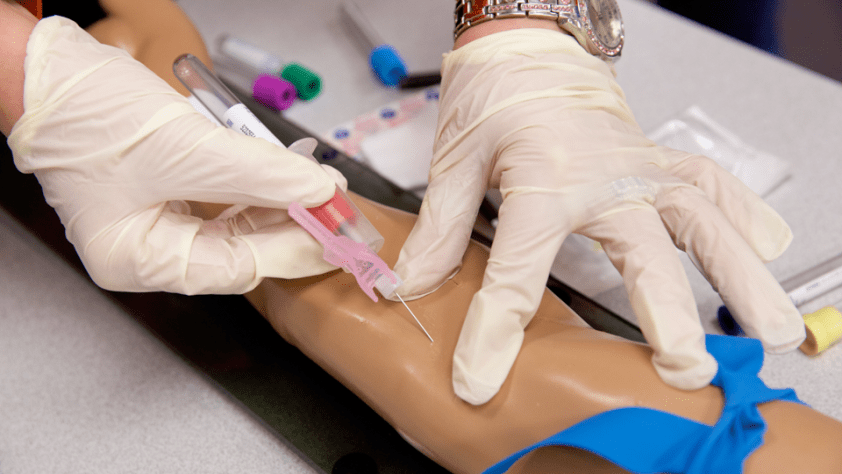The Course to Certification: Understanding the Phlebotomy Training Course Journey and Its Importance
As you think about the course to certification in phlebotomy, it's important to recognize the role you'll play in medical care. Your training will certainly cover necessary abilities, from blood collection methods to patient communication.

The Role of Phlebotomists in Medical Care
Phlebotomists play a necessary function in the health care system, acting as the important link in between individuals and important analysis screening. You'll do blood attracts, guaranteeing examples are collected precisely and securely. Your experience assists in detecting medical conditions, checking health and wellness, and guiding treatment choices.
In your daily interactions, you'll require to develop count on with individuals, making them really feel comfy during what may be a demanding experience. You are accountable for identifying and taking care of examples carefully to stop contamination or mistakes, which can affect test results.
Beyond this, you'll often work together with doctors and nurses, connecting vital details about patients' problems. By grasping your abilities, you add meaningfully to individual care, making you an essential part of the medical group.
Review of Phlebotomy Training Programs
When checking out phlebotomy training programs, you'll find different kinds made to fit different routines and discovering styles. Each program aids you establish essential abilities like blood collection and individual communication. Recognizing these alternatives is key to picking the appropriate course for your occupation.
Sorts Of Educating Programs
Numerous types of training programs are offered for those looking to end up being efficient in phlebotomy. In addition, some healthcare facilities and centers offer on-the-job training programs, supplying functional experience while you find out. Whatever path you select, each program intends to outfit you with the required skills for an effective phlebotomy occupation.

Secret Abilities Created
Mastering phlebotomy calls for a collection of key skills that are developed through complete training programs. You'll learn technological skills like correct blood vessel selection, needle insertion, and blood collection methods. These hands-on methods guarantee you can do treatments securely and successfully. Additionally, communication skills are fundamental; you'll require to communicate with individuals, describe procedures, and put them comfortable. Recognizing anatomy and physiology is vital, also, as it helps you locate veins and comprehend the body's response to blood attracts. You'll get understanding of safety methods and infection control, guaranteeing you maintain a clean and sterile atmosphere. Each of these skills is essential for your success as a qualified phlebotomist, making you an important possession in any medical care setting.
Key Elements of a Phlebotomy Program
In a phlebotomy training course, you'll focus on necessary subjects that prepared for your future career. You'll involve in hands-on training that permits you to apply what you have actually found out in real-world settings. Both the core educational program and sensible experience are important for your success as a phlebotomist.
Core Educational Program Summary
While seeking a phlebotomy training course, you'll come across a core educational program designed to furnish you with basic abilities and understanding. Phlebotomy school. This educational program generally consists of composition and physiology, concentrating on the blood circulation system and understanding blood parts. You'll additionally find out about different kinds of blood collection techniques, consisting of venipuncture and capillary slit methods
Additionally, infection control and safety methods are essential parts, guaranteeing you understand exactly how to maintain a sterile setting. You'll research patient interaction, emphasizing interaction and empathy, which are crucial for relieving person anxiousness.
Hands-On Training Experience
Obtaining hands-on experience is a crucial component of your phlebotomy training course. This sensible training enables you to use what you've learned in a real-world setting, enhancing your skills and confidence. You'll practice venipuncture strategies, find out how to handle various sorts of samplings, and obtain accustomed to the devices made use of in the field. Under the advice of seasoned instructors, you'll fine-tune your skills, ensuring you're gotten ready for any kind of circumstance you could encounter.
Furthermore, you'll obtain the chance to engage with patients, which is necessary for developing your interaction skills. This combination of technological effectiveness and interpersonal skills is critical for your success as a certified phlebotomist. Eventually, hands-on training is where concept meets method, strengthening your expertise and readiness for accreditation.
Qualification and Licensing Needs
Before you can start your occupation in phlebotomy, it is essential to understand the accreditation and licensing demands that differ by state. The majority of states require phlebotomists to hold a certification from an acknowledged company, such as the National Phlebotomy Organization or the American Culture for Professional Pathology. These certifications usually include passing an examination that checks your expertise and abilities in the area.
Along with qualification, some states have specific licensing requirements. You may need to complete a specific number of hours in scientific method, send evidence of training, or go through a history check. It is essential to investigate your state's regulations to ensure you satisfy all needed standards.
Remaining notified regarding these demands not only helps you secure a position yet additionally enhances your integrity as a specialist. By satisfying these needs, you'll be well on your method to a successful profession in phlebotomy.
Hands-On Training and Practical Experience
Hands-on training and useful experience are important components of Visit Your URL your phlebotomy education, as they permit you to use academic expertise in real-world scenarios. Throughout your training, you'll take part in supervised venipuncture, find out correct methods, and become accustomed to different blood collection devices. This direct participation is important for developing your self-confidence and refining your skills.
You'll work very closely with skilled professionals that can direct you through the nuances of person interaction and example handling. Each practice not only enhances your understanding however additionally prepares you for the hectic environment of medical care settings.
Additionally, lots of programs incorporate professional turnings, allowing you to experience varied settings, from health centers to outpatient centers. This direct exposure assists you adjust to different obstacles and client needs, ensuring you're well-prepared for your future duty. Accept these possibilities, as they're vital to becoming an experienced and compassionate phlebotomist.
Difficulties Dealt With During Training
While acquiring hands-on experience is essential, it's crucial to identify the obstacles that can arise during your phlebotomy training. Additionally, mastering the skills needed for blood draws takes practice; you may struggle with technique initially.
Time management can also be a hurdle, as balancing theory, practical sessions, and personal dedications can really feel daunting. You might encounter differing discovering speeds among your peers, resulting in feelings of self-doubt if you assume you're dropping behind. Lastly, adapting to the different characters of trainers can be challenging, as each might his explanation have an one-of-a-kind training style.
Identifying these barriers early can prepare you for success and aid you develop durability throughout your training trip.
Occupation Opportunities After Accreditation

As you gain experience, you could even consider concentrating on areas like pediatric or geriatric phlebotomy, providing to details patient needs. Some phlebotomists select to advance their professions by ending up being laboratory specialists or going after further education in health care areas.
Additionally, your accreditation can lead to functions in training or supervising brand-new phlebotomists, enabling you to share your expertise. With the medical care market constantly growing, your skills will certainly constantly remain in demand, leading the way for a steady and meeting career. Embrace pop over to this web-site the chances awaiting you!
Often Asked Questions
What Is the Normal Period of a Phlebotomy Training Course?
Phlebotomy training programs normally last around 4 to eight weeks. You'll engage in hands-on practice, class direction, and on-line understanding. Completing this training prepares you for qualification and a fulfilling job in healthcare.
Are Online Phlebotomy Courses Available?
Yes, on the internet phlebotomy programs are offered. They use versatility and ease, allowing you to examine at your own speed. Just verify the program is recognized to meet accreditation requirements and get valuable abilities for your profession.
How Much Does Phlebotomy Training Commonly Expense?
Phlebotomy training generally costs in between $700 and $2,500, depending upon the program and area. You ought to consider elements like program length, included products, and hands-on experience when selecting the ideal training for you.
What Are Typical Prerequisites for Phlebotomy Training?
Common prerequisites for phlebotomy training usually consist of a secondary school diploma or GED, immunizations, and a background check. Some programs may additionally require basic health care knowledge or accreditations, guaranteeing you're planned for hands-on training.
Can I Function While Completing My Phlebotomy Training?
Yes, you can function while completing your phlebotomy training. Many students balance tasks with their studies, but ensure to handle your time successfully to guarantee you meet both work and training dedications successfully.